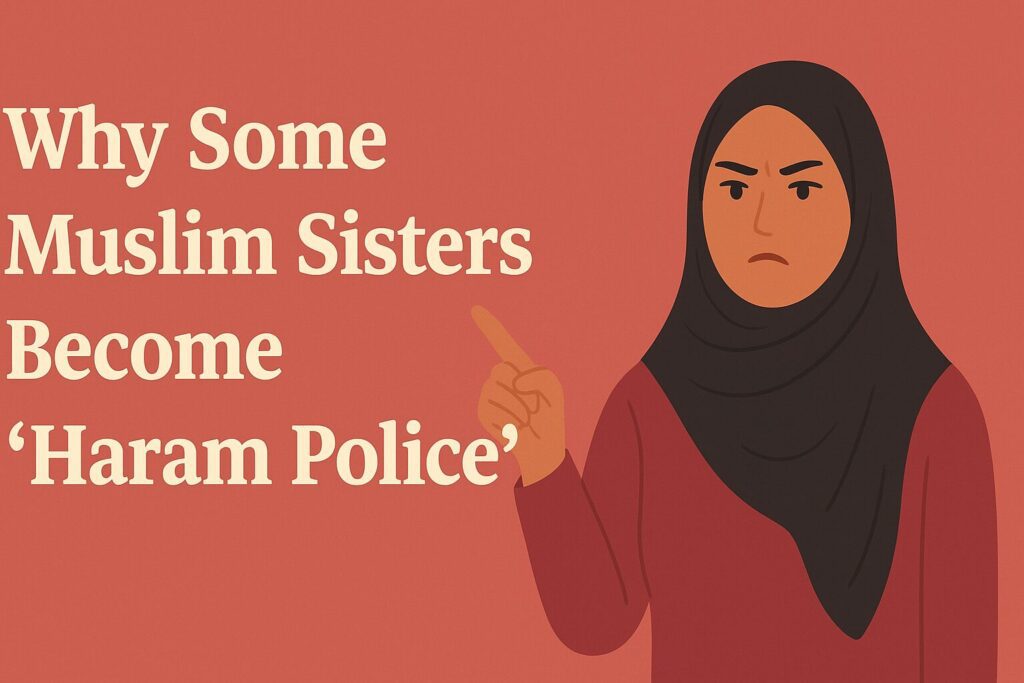Have you ever met that one sister in your community who knows exactly what’s halal and haram? You know the one—her conversation is peppered with unsolicited advice on how you should be living your life, from your hijab style to the fact that you’re probably committing a major sin by using the wrong phone case (because “it has a picture of a tree, and trees are sacred!”). Yes, we’re talking about the self-proclaimed “Haram Police.”
But why do some sisters, who once kept a low profile, turn into the unofficial enforcers of Islamic law, policing others’ actions with an unrelenting zeal? It’s like watching someone who used to love mangoes suddenly become obsessed with telling everyone else they’re eating them wrong.
Let’s dive in and explore why this happens—and how, in the process, they might unintentionally rub a few people the wrong way.
1. The “I’m Just Trying to Help” Syndrome
It all starts innocently enough. A sister starts praying regularly, perhaps after an emotional journey, a transformative experience, or just a realization that “it’s time to reconnect with Allah.” Slowly, they begin incorporating more religious practices into their daily lives, from fasting to memorizing more Qur’an to frequenting the masjid. Sounds pretty solid, right? Absolutely.
But here’s where things get interesting: this newfound devotion can trigger a subtle shift. Instead of focusing on their own spiritual growth, some sisters become hyper-aware of everyone else’s practices—often to the point of unsolicited advice. They start seeing every action as a reflection of someone’s closeness to Allah, and they feel duty-bound to correct what they perceive as deviations.
One day, they might casually comment on your choice of entertainment (“You watched that movie? It has music!”), or raise an eyebrow at your dinner plans (“You’re eating at that restaurant? They don’t serve halal meat properly!”). They’ve become the harbingers of what is “right” and “wrong,” and you, my friend, are now their project.
2. “I Know Best” Psychology
It’s not that they want to come off as holier-than-thou, but something about their increased devotion leads to the belief that they’ve cracked the code. In psychology, this could be explained by a phenomenon known as the illusion of superiority, where a person who starts achieving in one area (like religious observance) begins to believe they’re now an expert on all things related to that field. It’s like a beginner in yoga suddenly telling everyone they should only practice at sunrise or risk “not aligning their chakras correctly.”
For these sisters, their devotion becomes their identity—so much so that they might feel it’s their duty to help others achieve the same level of “piety,” even if that means interrupting your Instagram scroll or commenting on your social circle’s fashion choices. They see themselves as “helpers,” but the truth is, their advice is often unwanted and can be a bit too much. It’s like your mom sending you a 15-page WhatsApp message every time you eat a sandwich that isn’t perfectly halal—it’s for your own good, but you’d prefer it without the “concern.”
3. The Guilt-Driven Mindset
For many, religion is deeply tied to emotions like guilt and fear of not doing enough to please Allah. When a person makes a significant spiritual change—especially something that feels like a personal victory (like consistent prayer)—they might subconsciously use that newfound zeal to overcompensate for past mistakes.
In psychological terms, this could be linked to reactance theory, which is the idea that individuals who experience restrictions (either real or perceived) react in ways that push against those limits. For the sister who used to be less devout, her sudden increase in religious observance may come with a strong desire to “prove” herself—almost like she’s compensating for lost time. Thus, she’s not only being devout for herself but also trying to prove her worthiness to those around her. This can sometimes manifest as unsolicited advice, because she feels that if others follow her example, they’ll avoid the same mistakes she made. It’s as if she’s saying, “I don’t want you to have to go through what I went through.”
So, What’s the Bottom Line?
Becoming a “Haram Police” is often less about judging others and more about a person grappling with their own sense of righteousness. It’s a way for some sisters to make sense of their spiritual growth, albeit at the expense of others’ peace. It’s important to remember that devoutness in Islam doesn’t require policing others’ lives. The true measure of faith is how you live your own life, not how loudly you correct someone else’s.
If you’re ever caught in one of these interactions (or are accidentally guilty of “haraming” someone), it’s all about kindness, understanding, and maybe a little less unsolicited advice. We all need room to grow, and sometimes that means minding our own spiritual business.
3 Major Reasons Why Sisters Become the “Haram Police”
- The Overcompensation Factor
They may feel like they need to prove their piety because of past actions or a sudden return to faith. They might take their own faith journey so seriously that they feel compelled to direct others to “save” them from what they see as missteps. - The “Helpfulness” Trap
Sometimes they genuinely think they are doing others a favor, thinking their advice is essential for the listener’s well-being, but end up overwhelming or alienating others with their unsolicited wisdom. - The Illusion of Superiority
As they become more devout, they might mistakenly believe they know more than others or have achieved a higher level of spirituality. This sense of “knowing best” can spill over into nagging or unsolicited advice.
Final Thoughts
It’s totally okay to encourage one another in faith, but let’s be real—nobody wants to live in fear of the “Haram Police” lurking around every corner. Islam is a beautiful, personal journey, and the best way to inspire others is through our actions, not through constant correction. So, take a deep breath, smile, and remember—faith is a journey, not a policing activity.

